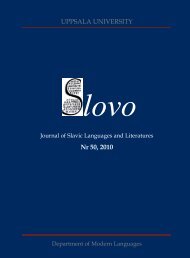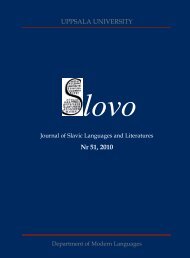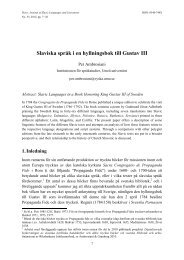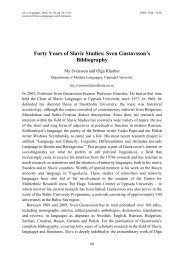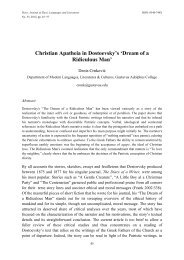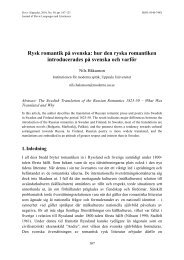Full text PDF - Index of - Uppsala universitet
Full text PDF - Index of - Uppsala universitet
Full text PDF - Index of - Uppsala universitet
You also want an ePaper? Increase the reach of your titles
YUMPU automatically turns print PDFs into web optimized ePapers that Google loves.
Atle Grønn<br />
‘Byvalo’ and ‘used to’ as verbal quantifiers<br />
However, the precise nature <strong>of</strong> habituals – modal or not – is not crucial for our main<br />
plot, since we find similar tense phenomena with verbal quantifiers that are not<br />
habituals. In this respect the following construction with the subjunctive<br />
complementizer čtoby under byvaet is rather puzzling:<br />
(49) Ведь бывает[un, uipf] же так, королева, чтобы надоел[up, upf] муж.<br />
(Michail Bulgakov, “Master i Margarita”)<br />
(50) It does[un] happen, Queen, that one grows[up] weary <strong>of</strong> one’s husband.<br />
(51) Det forekommer[un] jo, dronning, at man blir[un] lei av mannen sin.<br />
(Norwegian)<br />
The English and Norwegian translations clearly use constructions that are normally not<br />
considered to be habituals. Verbs like “happen”, etc. are known as “implicative verbs”<br />
since (Karttunen 1971). There is a link to factivity, but unlike factive verbs (“to<br />
know”, etc.), which presuppose the truth <strong>of</strong> their complements, implicative verbs<br />
entail their complement (which makes the subjunctive in the Russian original in (49)<br />
rather mysterious).<br />
With respect to habituals versus implicatives, the Russian byvaet/byvalo<br />
construction provides a nice contrast. Without a complementizer the interpretation is<br />
habitual, but with the complementizer čto (čtoby), we seem to get something more like<br />
an implicative reading (leaving the subjunctive element by in čtoby above as a puzzle).<br />
Here are some relevant examples:<br />
(52) Вдовьины яйца каждое воскресенье появлялись на Стекловском рынке,<br />
вдовьиными яйцами торговали в Тамбове, а бывало[up, uipf], что они<br />
показывались[up, uipf] и в стеклянных витринах магазина бывшего Сыр<br />
и масло Чичкина в Москве. (Michail Bulgakov, “Rokovye jajca”)<br />
(53) Each Sunday the widow's eggs appeared at Glassworks market. They were sold<br />
in Tambov and were[up] even occasionally displayed in the windows <strong>of</strong> the<br />
former Chichkin’s Cheese and Butter Shop in Moscow.<br />
Under byvalo, čto the past tense is most frequently used, as in (52), presumably owing<br />
to the implicative (factive) character <strong>of</strong> the construction. Interestingly, however, we<br />
also find the present tense – even with perfective verbs – under byvalo, čto:<br />
(54) Прежде бывало[up, uipf] так, что мисс Гуль найдет[un, upf] и<br />
покажет[un, upf] ей. (Lev Tolstoj, “Anna Karenina”)<br />
(55) It had[up] always happened before that Miss Hoole found[up] them [the<br />
mushrooms] and pointed[up] them out to her.<br />
(56) Før hadde[up] det vært slik at miss Gull hadde[up] funnet soppene og vist<br />
henne dem. (Norwegian)<br />
to”) can be modified by a semantically tenseless when-clause (“when” can be considered a temporal relative<br />
pronoun, hence an abstractor over the reference time).<br />
77



